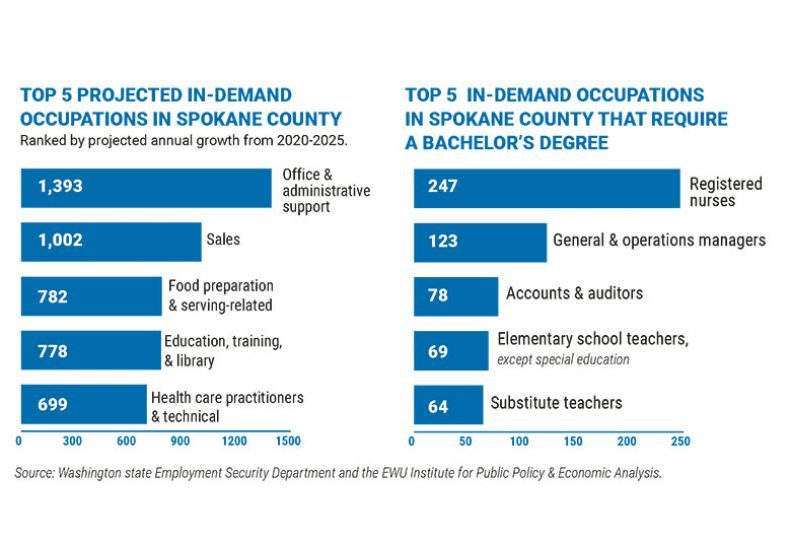
Home » Nursing to be most in-demand profession in Spokane, forecast says
Nursing to be most in-demand profession in Spokane, forecast says
Managers, accountants are runners-up in county

April 12, 2018
An annual occupational forecast from the Washington state Employment Security Department suggests that registered nurse will be the most in-demand occupation in Spokane County for jobs that requires at least a bachelor’s degree, says D. Patrick Jones, who assembled the data for Eastern Washington University.
In Spokane County, about 250 registered nursing positions are expected to need filling annually between 2020 and 2025, followed by about 120 general and operations manager positions and about 80 accountant and auditor jobs.
“I think that reflects what we know about the Spokane economy—that we have a very large health care sector that has continued to grow,” says Jones, who is the executive director of the Institute for Public Policy & Economic Analysis at EWU’s College of Business and Public Administration. “On the demand side for nursing, baby boomer nurses are retiring, and there’s a large replacement need. Then, the way health care is evolving, nurses are playing a larger role in primary care medicine, so that (demand) doesn’t surprise me in the least.”
Because the information he collected from the June 2017 economic forecast was geared for internal use at the university, it only pertains to occupations that require at least a bachelor’s degree, he says.
Other projected most in-demand occupations in the county that require a bachelor’s include a wide variety of teaching positions; market research analysts and marketing specialists; and mental health counselors, the forecast suggests.
In the Journal’s analysis of Employment Security Department data, occupations that will see the greatest demand, regardless of whether a bachelor’s degree is required, include: office and administrative support positions, with about 1,400 jobs opening annually; sales and related positions, with about 1,000 annual openings; food preparation and service-related jobs, with about 780 openings; education, training, and library occupations, also at about 780; and health care practitioners and technical occupations, at about 700 openings annually.
On the other hand, occupations requiring at least a bachelor’s expected to contract in Spokane County include statisticians, compensation and benefits managers, and zoologists and wildlife biologists. Those occupations are each expected to decline by one position annually during that 2020 to 2025 timeframe.
“When you compare the Spokane County forecast (job growth) ranking to that of the state, there’s quite a bit of difference,” says Jones. “I think, to a large degree, that reflects the difference of our local economy to the state of Washington’s economy.”
The relative lack of information technology-related job growth in Spokane County contrasts with statewide projections. Across Washington, nearly 4,000 software developer positions are anticipated to open annually between 2020 and 2025, making it the most in-demand occupation requiring a bachelor’s degree, the forecast indicates. In Spokane County, the software developer occupation ranks as 11th most in-demand position in Jones’ data, with only 43 projected job openings annually.
After software developer positions, the second largest predicted occupational growth in Washington is registered nursing, at just above 3,000 likely openings.
Certain teaching specialties, market research analysts and marketing specialists, and lawyers are anticipated to grow on both county and statewide levels, the data indicate.
At the state level, the top three fastest declining positions that require at least a college degree, respectively, are forensic science technicians, reporters and correspondents, and actors, the data indicates.
Spokane County is expected to see similar rates of growth of government, retail, and manufacturing positions as compared to Washington state, Jones’ research indicates.
However, the forecast isn’t without its limitations, says Jones.
For example, this is the first time EWU has studied the Employment Security Department annual forecast. Consequently, they don’t have archived material to determine how accurate past forecasts have been yet. The university plans to look into those archives in order to determine past prediction accuracy, says Jones.
The forecast focuses on new entries into each occupation, says Jones. Due to factors such as turnover, the actual number of overall job openings can be undercounted.
Jones also says the anticipated occupation growth or decline is computed using a statistical model and therefore is subject to a margin of error.
“You have to take these with a grain of salt and don’t put emphasis on just the number (for annual job growth),” he says.
Instead, Jones says the important aspect of this data is the respective rank and magnitude of each job demand.
For example, the fact that nearly 250 registered nursing positions are anticipated to open each year from 2020 to 2025 in Spokane County is less significant than the fact that those registered nursing positions are forecasted to be twice as in-demand as general and operations managers, the second most in-demand occupation expected here.
Overall, Jones says that economic forecast is “undoubtedly imperfect, but I would argue that it’s done relatively well, and we should pay attention to it.”
Established in 2002, the EWU Institute for Public Policy and Economic Analysis provides “data and analysis about a variety of factors in the region that will be useful for businesses, communities and others and they plan for the future,” the institute’s website says.
Latest News Up Close Health Care Education & Talent
Related Articles
Related Products



![Brad head shot[1] web](https://www.spokanejournal.com/ext/resources/2025/03/10/thumb/Brad-Head-Shot[1]_web.jpg?1741642753)
